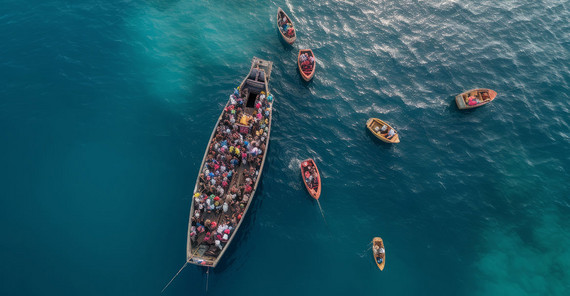The stretch of the Mediterranean Sea between North Africa and Italy is one of the most frequently used routes by migrants, refugees, and asylum seekers who want to reach Europe by sea. The researchers led by Alejandra Rodríguez Sánchez analyzed the data on attempted crossings of the central Mediterranean between 2011 and 2020 - and evaluated how and, above all, why they changed over time. To explain the observed fluctuations in the number of border crossings, they fed a number of factors into a computer model developed for this purpose: Factors that have been assessed included the number of government- and privately-led search-and rescue operations, exchange rates, international commodity prices, unemployment rates, conflict, violence, air traffic between African, Middle Eastern and European countries, and weather conditions.
“Our modeling showed that the changes in the number of border crossings by sea did not seem to be influenced by the so-called search-and-rescue operations, suggesting that these do not provide an incentive for additional crossing attempts,” says the study's lead author Alejandra Rodríguez Sánchez from the University of Potsdam. “Other factors such as conflict, economic or environmental conditions proved to be much more decisive.”
Meanwhile, the Libyan Coast Guard's expanded actions to intercepting and returning boats from 2017 onwards appeared to have led to a decrease in the number of attempted crossings. However, as the researchers observed, this coincided with reports of a deterioration in the human rights situation of potential migrants in Libya.
“Further research is needed to investigate how search-and-rescue operations affect the decision-making processes of individual migrants and the smugglers who coordinate the crossing attempts,“ she says.
The study, which involves Alejandra Rodríguez Sánchez as well as researchers from the Centre for International Security at the Hertie School in Berlin, the German Centre for Integration and Migration Research (DeZIM), and the Institute for Quantitative Social Science at Harvard University, was conducted as part of a larger research project on search and rescue in the Mediterranean at the DeZIM.
About the study:
Alejandra Rodríguez Sánchez, Julian Wucherpfennig, Ramona Rischke, Stefano Maria Iacus: “Search‑and‑rescue in the Central Mediterranean Route does not induce migration: Predictive modeling to answer causal queries in migration research“, Nature Scientific Reports (2023), DOI: 10.1038/s41598-023-38119-4
More on the DeZIM project “Sea Rescue in the Mediterranean”:
https://www.dezim-institut.de/en/projects/project-detail/seenotrettung-im-mittelmeer-3-12/
Contact:
Dr. Alejandra Rodríguez Sánchez, Postdoc at the Chair of Applied Social Research and Public Policy
Email: Alejandra.rodriguez.sanchezuuni-potsdampde
Media Information 03-08-2023 / Nr. 084

